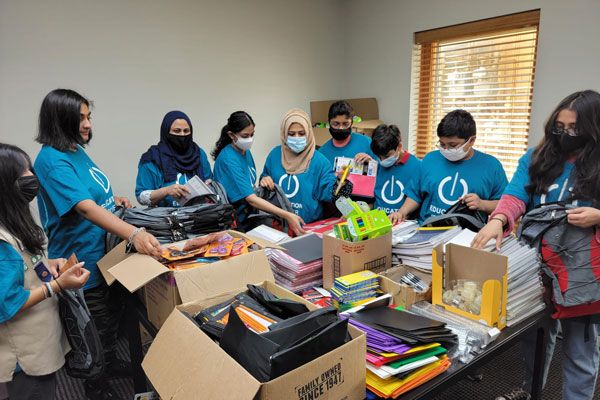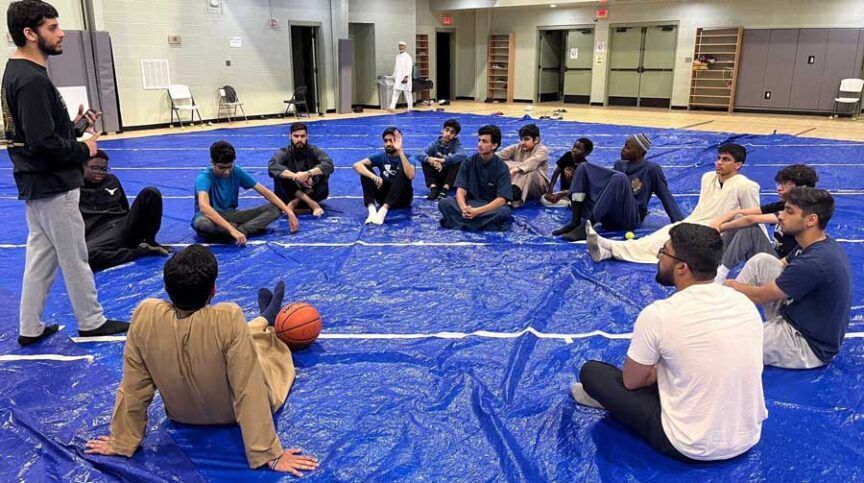“Who are the Muslims, really?” “Are they friend or foe — with us or against us?” These are the unsettling questions which have troubled many non-Muslim Americans for the last decade and a half. Unfortunately, Muslims in America are facing major setbacks regarding the perceptions of who we are and what we stand for. History has shown that certain minority groups have had their turn at being despised, such as the American Indians or African Americans, or being labeled “outsiders” like the Italians and then later the Japanese. Regrettably, it seems, Muslims currently hold this dishonorable distinction.
When we follow our religion, displaying the virtues and generosity of Islamic manners in every setting of our daily lives, thereby letting non-Muslims know us and, in turn, coming to know them.
Interestingly enough, from about the late 1960s to the end of 2001, some Muslim organizations in the U.S. were either directly or indirectly urging followers to embrace a lifestyle of isolationism. The popular position was that devout Muslims shouldn’t associate with non-Muslims outside of work or school. Nor should they get involved in interfaith activities. And furthermore, the mere idea of getting involved in politics was out of the question, a veritable waste of time and highly undesirable — some even implied that to do so was disloyal or haram (forbidden). My own household was likewise influenced by this isolationist mentality. I remember that my parents disapproved of me attending high school sports events or getting involved in any extracurricular activities. The feeling was that participating and supporting such activities might somehow weaken my faith in Islam.
Muslim Isolationism — A Failed Approach
It seems pretty clear that the isolationist strategy promoted by some Muslim American organizations was a complete fallacy. This was blaringly apparent immediately after the horrific World Trade Center tragedy on September 11, 2001, an attack which was categorically condemned as a crime against humanity by Muslims in America and around the world. Prior to this horrific event, Muslims were considered somewhat “exotic” and intriguing to non-Muslim Americans. However, after the World Trade Center atrocity, some believed they knew all they needed or wanted to know about Islam and Muslims, and the proverbial “fingers of suspicion” were vehemently pointed in the face of Islam in America. Everyday life for Muslims in American consequently changed dramatically.
A New American Muslim Social Strategy
After the horrific 9/11 tragedy, suspicion toward Muslims became the norm in the United States. Some Muslim organizations then began frantically scrambling to rethink their prior strategies, while simultaneously attempting to reassure fellow Americans that mainstream Muslims were just as outraged and devastated by this disaster as they were. The dilemma was that a few individuals who called themselves Muslims were being blamed—and suddenly the entire religion of Islam was unjustly being tried in the court of public opinion. Yet, the attacks on September 11th violated the very essence of what Islam stands for. In fact, is there any greater tragic irony than to suddenly label Islam, a religion which has promoted peace and justice for over 1400 years, as the faith of violence and terror?
Muslims know that service to fellow man is a fundamental principal in Islam, and all of us can do our part to be helpful, individually, when called upon.
Being prompted by the attacks on September 11, and after much crises management and damage control think-tank sessions, most Muslim organizations came to similar conclusions regarding how best to guide members to move forward as Muslims in America. Thus, a new “social” era was born for Muslim American organizations: Instead of the ill-fated strategy of isolationism, they began to promote a policy of “integration or assimilation without compromise.” The new recommendations for Muslim American families was that they take steps to assimilate into the greater society without compromising their Islamic faith and values, or violating any principles of Islamic practice. In so doing, Muslims could become more deeply interwoven into the fabric of American society, would have a voice, and be viewed as contributing, conscientious, fellow Americans.
Assimilation Without Compromise
So how should average Muslim families proceed to assimilate into society without compromising their Islamic faith? First, Muslims can think of themselves, not as part of a “melting pot,” but rather as an important ingredient in a “tossed salad.” Muslims can integrate into the larger American community while maintaining their Islamic identity, and through strong faith and exemplary demeanor and conduct, they can navigate the social intricacies of daily life. It’s important to note that this is far from any notion of yielding to demands of “fitting in” in some unprincipled or conformist popular-culture way. Assimilating without compromise means exactly that – weaving into the American fabric without compromising one’s Islamic convictions and values.
Muslims have been in America arguably from its establishment, and will continue to live in and make contributions toward its betterment.
Allah (SWT) says: “….We created you nations and tribes that you may know one another” (Quran 49:13). Nowhere in the Quran does it say that Muslims should stay separate and isolate themselves in a protective bubble away from the rest of the world. Allah (SWT) explains why Muslims are a good example for others: “You are the best nation raised up [as an example] for mankind. You enjoin what is right and forbid what is wrong and believe in Allah” (Quran 3:10). When we follow our religion, displaying the virtues and generosity of Islamic manners in every setting of our daily lives, thereby letting non-Muslims know us and, in turn, coming to know them — and when we, further, stand shoulder to shoulder with those committed to social justice — we can begin to disprove the venomous lies being spread about Islam, Muslims, and the Prophet, and thereby dismantle the defamation campaign waged against us.
In the Work Place
America is known as the “land of opportunity,” and the fact is that Muslim American families work hard and make positive contributions to society as doctors, engineers, educators, business people, and in countless other professions. The work place is a fertile ground for Muslims to represent themselves as outstanding employees and employers. Muslims should strive for excellence whether as a server at a restaurant or the CEO of a major corporation. Prophet Muhammad (pbuh) has said: “Verily, Allah has prescribed excellence in all things…” (Muslim). As in all walks of life, Muslims must be honest employees, as exemplified by the Prophet Muhammad (pbuh), who was nicknamed Al-Amin, the trustworthy one. The restaurant owner should never worry that a Muslim employee would steal from the cash register, and a Muslim CEO should demonstrate great qualities of leadership and integrity, including treating all employees justly. Muslims should set a good example in the workplace by striving to be on time, meet all work-related commitments, and always give one hundred percent effort in their daily work routines as well as special projects.
Excellence in Academic Environments
Schools are a wonderful place for the dissemination of truthful information about Islam and Muslims. Nearly every student will have an opportunity at some point or another to give a presentation about Islam, interact in casual discussions about religion, or correct inaccurate information being taught during a lesson about Islam. All students, whether in high school or college, should take full advantage of these golden opportunities to convey authentic and correct information about Islam. They also should strive to exemplify the characteristics of ideal Muslim character — in actions and words, and should strive for excellence in academics. It’s not about obsessing over straight As, but about doing one’s absolute best and being a good role model. For those inclined toward sports and fitness, it also involves maintaining ones Muslim personality and manners while interacting with fellow athletes. This means being respectful to coaches, teammates, and showing good sportsmanship when losing by congratulating opponents. It also calls for being a moral leader — not a follower, and interacting without diminishing one’s Islamic commitment and resolve.
School Involvement by Parents is Essential
In addition to students playing an important role in representing Islamic character at school, parents too can play an important role by showing concern for the greater school community and participating in their PTA (parent teacher association). Parents should visit with teachers and principals and be active in helping with school functions including helping out with fundraisers, contributing snacks for class parties, or accompanying the class for field trips. It is very beneficial for parents to play an active role and show that they are involved and caring parents, community members, and fellow citizens.
Kindness to Neighbors
Average Americans should be happy to have Muslims as neighbors. Being a good neighbor is a wonderful opportunity for indirect dawah. Indeed, for a Muslim to be unjust in any way to his neighbor violates the letter and the spirit of Islam. The Prophet (pbuh) said, “One is not a Muslim if his neighbor does not feel safe from his mischief” (Bukhari). There are many ways to show the spirit of Islam to neighbors — helping them when they ask, bringing them gifts from one’s travel, giving them sweets during the holidays, and visiting them when they are sick. There is a beautiful story about one of the Prophet’s neighbors who used to regularly throw trash in his yard. One day the Prophet found no trash so he went to enquire about this neighbor and learned she was sick. The Prophet then visited her and she was so moved by his graciousness and caring that she embraced Islam.
Muslims and the Political Process
America is a land “of the people, for the people, by the people,” and as such, it is in Muslims’ best interest to be civically engaged, actively participating in the political process. This is the way to effect positive change in communities around the country, and also to influence how the U.S. deals with other nations around the world. Getting involved is not only about voting during elections or campaigning for candidates, but also, for those so inclined, running for office. Some Muslims including Rep. Keith Ellison of Minnesota and Rep. Andre’ Carson of Indiana have already paved the way for Muslims in politics. Joan Walsh, currently national affairs correspondent for The Nation, wrote in an article for the Minnpost.com, “The fact is, we need more Keith Ellisons in Congress. Not just because he’s a great progressive voice, supporting the president but challenging him strongly on his questionable austerity politics, but also because he’s a patriotic American who’s also a Muslim. He’s crucial right now.” For Muslims to become civically engaged, it’s more than just “talking the talk” about making positive change — it’s about walking the extra miles to change the narrative about Islam and improve American perception of Muslims and the religion.
Interfaith Programs Help Counter Misinformation
Through various interfaith programs, Muslims have an opportunity to represent the truth about Islam by not only educating non-Muslims about its rich heritage contributing great mathematical and scientific advancements for civilization, but also its 1400 year legacy of promoting peace and justice. Toward this end, masjids can have annual open houses, and Muslim individuals and groups can take part in programs and panel discussions set up by various religious groups in their places of worship. These programs go a long way in countering the lies and misinformation being disseminated.
Representation in Media and Professional Sports
Muslim Americans must have a voice in the media. How can we present the truth about Islam if we’re not part of the conversation? These days, alhamdullilah, we see more Muslims getting involved in producing films, being interviewed as experts on major news networks like CNN, and being visible in professional sports. As Muslims continue to be more prominently featured in the media, and non-Muslims begin to realize Muslims are making positive contributions, perhaps the tides will turn from suspicion to appreciation for Islam and Muslims.
Muslim Social Service Exemplifying Islam
Muslims know that service to fellow man is a fundamental principal in Islam, and all of us can do our part to be helpful, individually, when called upon. However, on a daily basis, millions of Americans are in need of various social services from shelter, to soup kitchens, even disaster relief. Those who provide such help are a lifeline for the destitute or afflicted. Prophet Muhammad (pbuh) said, “The most beloved of people according to Allah is he who brings most benefit to people.”
This hadeeth is a “call to action” which all of us can answer in our own way. On a larger scale, however, although Muslim social service organizations have made steady progress in the realm of social services, they are still not known as the “go to” place for non-Muslim Americans in times of need or distress. This is due to a variety of factors including lack of resources. However, in years to come this could change. Insha’Allah once greater numbers of non-Muslims begin seeking and receiving crucial help in times of need from Muslim social service agencies, Islam will gradually be known for what it is — a religion of compassion, peace, and justice.
Muslims have been in America arguably from its establishment, and will continue to live in and make contributions toward its betterment. Despite the fact that there are segments of the population which have motives to portray Muslims as the “enemy,” we should nonetheless remember that ultimately Allah (SWT) is in charge and has a greater plan for all our affairs. Each of us should work to deepen our faith individually, and also make dua to improve our collective situation.
Allah (SWT) says in the Quran: “Assuredly you will be tried in your property and in your persons, and you will hear much wrong from those who were given the Scripture before you, and from the idolaters. But if you persevere and ward off [evil], then that will be a determining factor in all affairs” (Quran 3:186).






